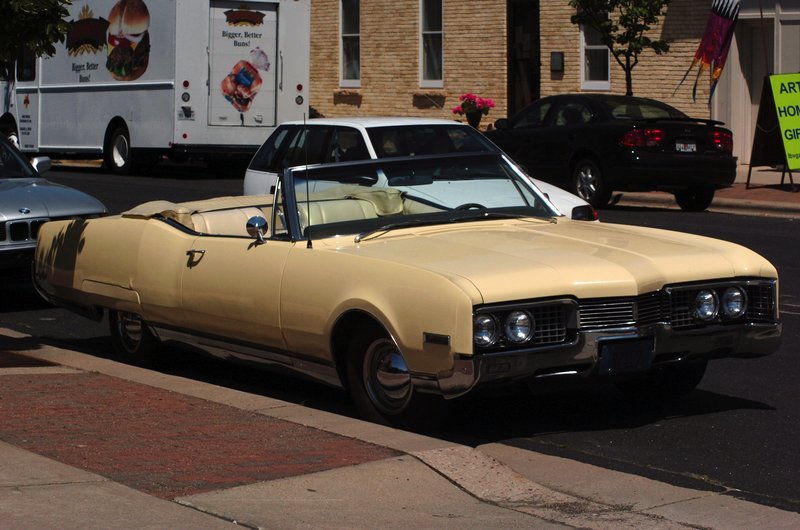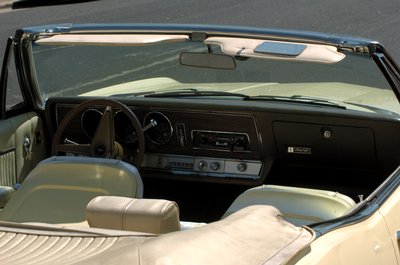A friend is heading home on leave from Iraq today. I thought I’d write him a note—then I decided to publish it here:
Dear _____, I am at an uncharacteristic loss for words. Hence, I don’t know what to say other than “Thank you.” As we both know, the war is a contentious issue here in the Homeland. Many think we must indeed stay the course; at least as many think the war is a reckless, counterproductive disaster.
Olds 98 Convertible


Classic barge: The Oldsmobile 98 Convertible.
The Shopping Carts Have Cooties
According to studies done on shopping carts, more than 60 percent of them are harboring coliform bacteria (the sort more often associated with public toilet seats). “These bacteria may be coming from raw foods or from children who sit in the carts,” says Chuck Gerba, Ph.D., a microbiologist at University of Arizona. “Just think about the fact that a few minutes ago, some kid’s bottom was where you are now putting your broccoli.” According to studies done by Gerba and his colleagues at University of Arizona, shopping carts had more bacteria than other surfaces they tested—even more than escalators, public phones and public bathrooms. To avoid picking up nasty bacteria, Gerba recommends using sanitizing wipes to clean off cart handles and seats, and to wash your hands after you finish shopping.
Classic Lime Green Corvette Drop Top


Ratatouille, Simply Brilliant
The moral of “Ratatouille” is delivered by a critic: a gaunt, unsmiling fellow named Anton Ego who composes his acidic notices in a coffin-shaped room and who speaks in the parched baritone of Peter O’Toole. “Not everyone can be a great artist,” Mr. Ego muses. “But a great artist can come from anywhere.”
Quite so. Written and directed by Brad Bird and displaying the usual meticulousness associated with the Pixar brand, “Ratatouille” is a nearly flawless piece of popular art, as well as one of the most persuasive portraits of an artist ever committed to film. It provides the kind of deep, transporting pleasure, at once simple and sophisticated, that movies at their best have always promised.
Its sensibility, implicit in Mr. Ego’s aphorism, is both exuberantly democratic and unabashedly elitist, defending good taste and aesthetic accomplishment not as snobbish entitlements but as universal ideals. Like “The Incredibles,” Mr. Bird’s earlier film for Pixar, “Ratatouille” celebrates the passionate, sometimes aggressive pursuit of excellence, an impulse it also exemplifies.
The hero (and perhaps Mr. Bird’s alter ego) is Remy (Patton Oswalt), a young rat who lives somewhere in the French countryside and conceives a passion for fine cooking. Raised by garbage-eaters, he is drawn toward a more exalted notion of food by the sensitivity of his own palate and by the example of Auguste Gusteau (Brad Garrett), a famous chef who insists — more in the manner of Julia Child than of his real-life haute cuisine counterparts — that “anyone can cook.”
I was impressed with this film on many levels, especially the incredible attention to details. Bird’s framing of Ego was superb. Go! Brad Bird directs (he also lead the Incredibles).
Interesting Look at How Easy it is to say “No”, rather than take a risk
Given the mass hysteria, it’s probably not so good to be Denny Strigl this week. He’s the COO at Verizon quoted with pride about turning down the iPhone deal (Verizon turned down iPhone’s advances.)
The reason you need to care about this: Almost everyone is like Denny.
Most innovative business people who dream of bizdev imagine that they can be just like Steve Jobs. Come up with a super idea, a useful service, a great gizmo and go to an industry leader. Sign lots of NDAs and go to lots of meetings. Demand that they change their ways in order to make your wonderful innovation a game changer, something that will fix their broken industry and make you both a lot of money.
When Public Records are Too Public
But then there’s another set of personal details that have made their way online, and these documents are much more worrisome. Property deeds, marriage and divorce records, court files, motor-vehicle information and tax documents are increasingly being digitized, and contain a wealth of information that few of us would want online: Social Security numbers, birth dates, maiden names and images of our signatures. Local governments have rushed to put those documents online for a decade or so, often without scrubbing them of such information. And that’s made them potentially fertile ground for busybodies, stalkers and identity thieves.
Betty “BJ” Ostergren, a 58-year-old from outside Richmond, Va., has made it her mission to alert people to the dangers of public records online. Ms. Ostergren is feisty bordering on ferocious: Her tactics include mailing letters to people alerting them that their personal information is online and posting copies of public documents (or links to them) displaying the personal information of circuit-court clerks and other politicians, including former House Majority Leader Tom DeLay and Florida Gov. Jeb Bush. (See her Web site, the Virginia Watchdog, here; this Washington Post profile of her is also a good read.)
iPhone: Game Changer
Apple’s iPhone has received no shortage of hype since it was announced earlier this year. From a technology perspective, I find the multi-touch interface most interesting. It cleanly addresses many small screen issues, including navigation and zoom in/out.
Having said that, I believe the real paradigm shift is the activation process. Years ago, while replacing a dead phone, I stood at the usual cell phone counter for quite some time while the customer in front of me went through a long activation process with Verizon’s representative. What a waste of time.
Apple has dramatically simplified (assuming it works) the activation process by baking it into iTunes. Buy the phone via bricks and mortar or online, sync and activate with your mac or pc and get on with it.
In many ways, Apple has pulled an identity-ectomy (identiectomy?) on AT&T. They are selling phones via AT&T’s channels, but the user experience (and therefore brand and stock price leverage) is all Apple. AT&T will get the fumes, but this is Apple’s win. I’m no fan of AT&T [rss].
Finally, two years ago, while on travel, I spoke with someone who should/would know. This person told me that the iPhone was due later that summer (2005). I wonder if Apple scrapped an early version and decided to wait for the right time and place in terms of technology and software? If so, that takes guts, particularly given the pieces that need to be in place for a launch.
Eliminate Agriculture Subsidies?
Mr. Kind, a six-term congressman, has introduced legislation that would drastically reduce farm subsidies while pouring more money into land conservation programs and rural development. He gathered 200 votes for a similar bill in 2002 and says he believes he has additional momentum this time around.
“There are so many reasons to do it,” Mr. Kind said, ticking off high crop prices and increasing pressure from foreign trading partners as two reasons to curb subsidies. “Now we are going to see if this Congress has the stomach for meaningful reform.”
To no one’s surprise, Mr. Kind’s crusade has raised the hackles of the powerful farm lobby and its supporters in Congress, who describe his proposal as naïve, ill conceived and even dangerous.
Lonely Planet founder scopes out sensationally bad places
In nearly four decades of incessant globe-trotting, Tony Wheeler, the co-founder of Lonely Planet, has seen nearly all the planet’s sensationally wonderful places. He’s also seen the great places, the pretty good places, the so-so places and the not-too-bad places. There wasn’t much left to do but to start collecting passport stamps from the really bad places.
The result is one of the most oddly compelling travel books in recent years, “Bad Lands: A Tourist on the Axis of Evil — With Additional Excursions to Places That Are Slightly Misguided, Mildly Malevolent, Seriously Off-Course, Extraordinarily Reclusive and Much Misunderstood.”
Wheeler pulled off the Axis of Evil hat trick: Iraq, Iran and North Korea. Then he moved on to Afghanistan, Burma/Myanmar, Saudi Arabia, Cuba and George W. Bush’s new favorite country, Albania, for a nostalgic look at the bad old days under Enver Hoxha.
The obvious question is, uh, why? I asked Wheeler this over lunch in San Francisco recently.
